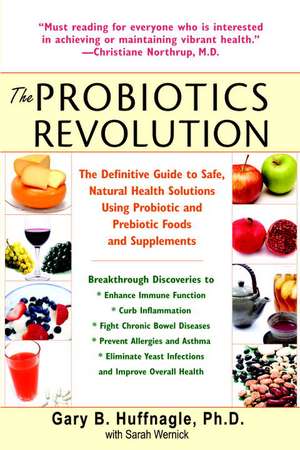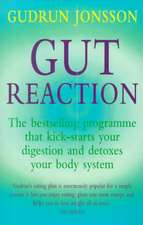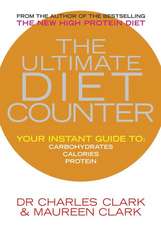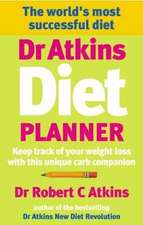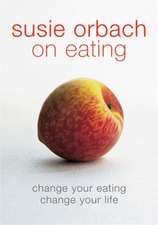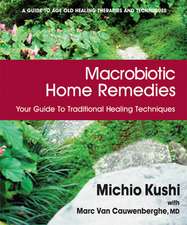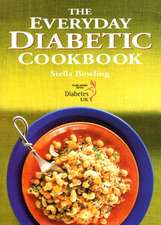The Probiotics Revolution: The Definitive Guide to Safe, Natural Health Solutions Using Probiotic and Prebiotic Foods and Supplements
Autor Gary B. Huffnagle Sarah Wernicken Limba Engleză Paperback – 31 mai 2008
Thanks to an explosion of research in recent years, one thing is clear: probiotics, the healthy bacteria that inhabit the digestive tract, are the body’s silent partners for good health, optimizing the power of the immune system to fight disease and the “bad” germs we fear. But how do they work? And in the face of factors like stress and poor diet, which decrease their numbers, how do you keep your supply well stocked?
Here is an up-to-the-minute, highly accessible guide to probiotics and the foods and supplements that contain and support them—many of which may be in your diet already. Discover:
The key role of probiotics and prebiotics in restoring healthy balance to our bodies, improving immune system functioning, and curbing inflammation
How to use probiotic foods and supplements to prevent and relieve allergies, inflammatory bowel disease, irritable bowel syndrome, yeast infections, and the negative side effects of antibiotic use
New evidence that probiotics may help fight asthma, cardiovascular disease, breast and colon cancer, autoimmune diseases, chronic fatigue, fibromyalgia—and even obesity
Natural sources of prebiotics, the nutrients that help make the digestive tract more hospitable for probiotic bacteria
The Probiotics Revolution also includes a step-by-step plan for incorporating the many food sources of probiotics and prebiotics into your diet, a complete buyer’s guide to probiotic supplements, and how to introduce probiotics to your family and children.
From the Hardcover edition.
Preț: 126.98 lei
Nou
Puncte Express: 190
Preț estimativ în valută:
24.30€ • 25.44$ • 20.10£
24.30€ • 25.44$ • 20.10£
Carte disponibilă
Livrare economică 15-29 martie
Preluare comenzi: 021 569.72.76
Specificații
ISBN-13: 9780553384192
ISBN-10: 0553384198
Pagini: 412
Dimensiuni: 152 x 226 x 23 mm
Greutate: 0.57 kg
Ediția:Reprint
Editura: Bantam
ISBN-10: 0553384198
Pagini: 412
Dimensiuni: 152 x 226 x 23 mm
Greutate: 0.57 kg
Ediția:Reprint
Editura: Bantam
Notă biografică
Gary B. Huffnagle, Ph.D., is Professor of Internal Medicine, Microbiology, and Immunology, University of Michigan Medical Center. His research on probiotics has appeared in leading scientific journals and has been featured in Newsweek, Forbes, and on BBC News.
Sarah Wernick is the coauthor of several bestselling health books, including Strong Women Stay Young.
From the Hardcover edition.
Sarah Wernick is the coauthor of several bestselling health books, including Strong Women Stay Young.
From the Hardcover edition.
Extras
Chapter One
Our Silent Partners for Good Health
When I was five years old, I received my first lesson in microbiology from a Dixie cup commercial on TV. It showed magnified images of bug-like microbes, followed by a horrifying picture of a family’s shared, bacteria-laden drinking glass in the bathroom. My health-conscious mother subsequently banished shared glasses and installed Dixie cup dispensers. Thus I learned that all bacteria are bad and that we must avoid them to stay healthy.
Now that I spend my days (and many nights) tracking down the secrets of microbes, I know that none of that is true. In fact, some bacteria—called probiotics—are not only beneficial to our health, but actually essential. The term “probiotics” comes from the Greek: pro, meaning “promoting” and biotic, meaning “life.” Probiotic bacteria normally live in our digestive tract, especially if we eat foods that contain them, such as yogurt with active cultures, aged cheese, and naturally fermented pickles.
As new research is revealing, the probiotic population in our digestive tract often isn’t large enough for optimal health. As a result, other bacteria can proliferate, creating an imbalance. Obviously, this affects how well our digestive system functions. But we’re learning that the impact goes far beyond that. Probiotics are vital for our immune system, too. They actually send signals to the immune system that reduce destructive overreactions, including inflammation. This means that insufficiencies affect immune responses—and therefore every aspect of our health.
Though our bodies don’t always contain enough probiotics, we can easily solve that problem. All it takes is increasing our consumption of certain healthy foods (many are probably in your diet already) and perhaps taking some readily available nutritional supplements, which need to be carefully selected. Best of all, these measures aren’t risky. The effective foods taste good—and you’ll begin to see benefits within weeks. If your diet is already healthful, you’ve made an excellent start. However, as this book will explain, there is much more you can do. And it doesn’t have to happen all at once, because every little bit helps. A New Essential Food Group Probiotics protect us in two ways. One is to compete successfully with potentially harmful microbes in our digestive tract, also known as the gut. That doesn’t mean killing all of them. Rather, probiotics lower their population enough so that we’re much less vulnerable to intestinal disorders and disease. Anyone who suffers from chronic digestive problems knows that a healthy gut is essential to well-being—and sometimes maddeningly elusive.
Perhaps even more important, probiotics help the immune system to function properly. Our immune system acts like a police force, protecting us from germs. But if it overreacts, it can be the cause of disease rather than the cure. A trigger-happy immune system may discharge its potent weapons against harmless substances—dust, cat dander, eggs, peanuts—thereby producing allergic responses. These reactions are always uncomfortable and sometimes are severe enough to be life-threatening. An unrestrained immune system can even turn against our own cells, causing autoimmune disorders such as ulcerative colitis, Crohn’s disease, and rheumatoid arthritis.
We can increase the probiotic population of our intestinal tract by consuming foods and supplements that contain these beneficial microbes. But we also must provide them with a hospitable place to live. Not surprisingly, our intestinal environment is shaped by what we eat. Foods that strengthen probiotics are called prebiotics; these include fruits, vegetables, and whole grains. But other foods, including products high in refined sugar, encourage the growth of harmful microbes.
It’s not a coincidence that the list of prebiotics features items we already know are good for us. Probiotics thrive on certain types of fiber and antioxidants. Most people know that foods rich in these components have a wide range of beneficial health effects. I’m convinced that their underappreciated role as prebiotics helps explain why.
To me, probiotics and prebiotics aren’t optional additions to our diet. They’re an essential food group, one that provides nutrients just as important to our health as vitamins and minerals. This vital food group is missing from current nutrition recommendations. But I expect that omission to be corrected in the near future. Extraordinary Benefits from Ordinary Foods Medical scientists searching for new ways to optimize immune responses have found an effective solution in the supermarket. New evidence shows that probiotics can prevent and treat serious chronic illnesses. Below, I’ll give you a preview. But we’re also learning that probiotics ward off many minor problems that occasionally strike all of us, even if we’re in apparently excellent health.
A fascinating Swedish study, published in Environmental Health in 2005, focused on 181 healthy men and women ages 18 to 65, all of them employed by the same company. Half were chosen at random to receive special straws that delivered a daily dose of probiotics as they sipped a beverage of their choice. The others were given look-alike straws containing no probiotics. For eighty days, participants used the straws and kept health diaries, recording any respiratory or gastrointestinal symptoms that caused them to call in sick.
During the study period, 26 percent of those with the ordinary straws took time off from work because of gastrointestinal or respiratory illness. In contrast, only 16 percent of the workers who received the probiotic required sick leave, a reduction of more than one-third. Other recent findings confirm that probiotics can prevent infectious disease (or at least speed recovery). What’s more, these striking benefits come without any adverse side effects.
The potential benefits of probiotics for those who suffer from chronic diseases are so extraordinary that they can sound like the claims that snake oil salesmen used to make at carnivals. But here at the University of Michigan Medical Center, as well as at other leading medical schools in the United States and abroad, research breakthroughs are bringing together the fields of microbiology, immunology, nutrition, and physiology as never before. This collaboration has produced findings—some just emerging from the laboratory and not yet published—that are difficult to believe at first. In Part 2 of the book, I’ll describe this work in more detail. Here’s a preview: Digestive Disorders: Diarrhea, Inflammatory Bowel Disease, Irritable Bowel Syndrome, and More Digestive problems are a chronic private agony for millions of Americans—and nearly all of us experience occasional unpleasant episodes. Difficulties can occur when the probiotic bacteria in our intestines are unable to compete with an onslaught of harmful bacteria.
Probiotics are now used to prevent or treat diarrhea due to antibiotic treatment, infections, chemotherapy, radiation therapy, or the unfamiliar microbes encountered in foreign travel. Many gastrointestinal specialists prescribe probiotic therapy for irritable bowel syndrome. Other common digestive problems that don’t involve the immune system may respond to probiotics, too; one example is lactose intolerance.
Immune system malfunctions are responsible for chronic digestive problems that involve inflammation. One example is inflammatory bowel disease (IBD), a group of closely related diseases—including ulcerative colitis and Crohn’s disease—in which the immune system overreacts to normal intestinal microbes, causing inflammation and ulcers (open sores). Several clinical trials—carefully controlled medical studies involving hundreds of patients—have found that probiotics show great promise for the treatment of IBD. Allergies, Eczema, Asthma, and Related Conditions Allergic reactions, we now know, are caused when the immune system overreacts to harmless substances. Just within the past few years, we’ve discovered that probiotic bacteria can control these overreactions. Exciting studies from Finland have found that when pregnant or breastfeeding women take probiotics, their babies are significantly less likely to suffer from eczema. This inflammatory skin reaction affects more than thirty million Americans, causing severe itching.
Now probiotics are under intense investigation as an allergy treatment. Currently, millions of allergy sufferers must choose between uncomfortable symptoms and significant side effects from medication. I’m confident that probiotic therapies, which rarely involve such problems, will resolve that dilemma.
Still another promising line of research involves asthma, a chronic condition in which the airways are inflamed and narrowed. People who suffer from asthma face terrifying attacks that can be triggered by allergies, exercise, or adverse weather conditions. During an asthma attack, the airways narrow to the point where a person has difficulty breathing and could even die. Since asthma involves an inappropriate immune response, including inflammation, there’s excellent reason to hope that probiotics could help. Yeast Infections Most yeast infections are caused by Candida albicans, a yeast that’s normally kept in check by the probiotic Lactobacillus and other microbes that live in our intestines. But this natural defense may not always work. For example, hormonal changes, stress, and a poor diet can predispose a woman to vaginal yeast infections. Or the problem may be antibiotic treatment, which doesn’t harm yeasts but does kill their microbial competitors, allowing yeasts to proliferate.
Alternative medicine has long treated yeast infections by adding yogurt or probiotic supplements to the diet; yogurt is also a common folk remedy. Preliminary research suggests that certain probiotics are indeed effective.
From the Hardcover edition.
Our Silent Partners for Good Health
When I was five years old, I received my first lesson in microbiology from a Dixie cup commercial on TV. It showed magnified images of bug-like microbes, followed by a horrifying picture of a family’s shared, bacteria-laden drinking glass in the bathroom. My health-conscious mother subsequently banished shared glasses and installed Dixie cup dispensers. Thus I learned that all bacteria are bad and that we must avoid them to stay healthy.
Now that I spend my days (and many nights) tracking down the secrets of microbes, I know that none of that is true. In fact, some bacteria—called probiotics—are not only beneficial to our health, but actually essential. The term “probiotics” comes from the Greek: pro, meaning “promoting” and biotic, meaning “life.” Probiotic bacteria normally live in our digestive tract, especially if we eat foods that contain them, such as yogurt with active cultures, aged cheese, and naturally fermented pickles.
As new research is revealing, the probiotic population in our digestive tract often isn’t large enough for optimal health. As a result, other bacteria can proliferate, creating an imbalance. Obviously, this affects how well our digestive system functions. But we’re learning that the impact goes far beyond that. Probiotics are vital for our immune system, too. They actually send signals to the immune system that reduce destructive overreactions, including inflammation. This means that insufficiencies affect immune responses—and therefore every aspect of our health.
Though our bodies don’t always contain enough probiotics, we can easily solve that problem. All it takes is increasing our consumption of certain healthy foods (many are probably in your diet already) and perhaps taking some readily available nutritional supplements, which need to be carefully selected. Best of all, these measures aren’t risky. The effective foods taste good—and you’ll begin to see benefits within weeks. If your diet is already healthful, you’ve made an excellent start. However, as this book will explain, there is much more you can do. And it doesn’t have to happen all at once, because every little bit helps. A New Essential Food Group Probiotics protect us in two ways. One is to compete successfully with potentially harmful microbes in our digestive tract, also known as the gut. That doesn’t mean killing all of them. Rather, probiotics lower their population enough so that we’re much less vulnerable to intestinal disorders and disease. Anyone who suffers from chronic digestive problems knows that a healthy gut is essential to well-being—and sometimes maddeningly elusive.
Perhaps even more important, probiotics help the immune system to function properly. Our immune system acts like a police force, protecting us from germs. But if it overreacts, it can be the cause of disease rather than the cure. A trigger-happy immune system may discharge its potent weapons against harmless substances—dust, cat dander, eggs, peanuts—thereby producing allergic responses. These reactions are always uncomfortable and sometimes are severe enough to be life-threatening. An unrestrained immune system can even turn against our own cells, causing autoimmune disorders such as ulcerative colitis, Crohn’s disease, and rheumatoid arthritis.
We can increase the probiotic population of our intestinal tract by consuming foods and supplements that contain these beneficial microbes. But we also must provide them with a hospitable place to live. Not surprisingly, our intestinal environment is shaped by what we eat. Foods that strengthen probiotics are called prebiotics; these include fruits, vegetables, and whole grains. But other foods, including products high in refined sugar, encourage the growth of harmful microbes.
It’s not a coincidence that the list of prebiotics features items we already know are good for us. Probiotics thrive on certain types of fiber and antioxidants. Most people know that foods rich in these components have a wide range of beneficial health effects. I’m convinced that their underappreciated role as prebiotics helps explain why.
To me, probiotics and prebiotics aren’t optional additions to our diet. They’re an essential food group, one that provides nutrients just as important to our health as vitamins and minerals. This vital food group is missing from current nutrition recommendations. But I expect that omission to be corrected in the near future. Extraordinary Benefits from Ordinary Foods Medical scientists searching for new ways to optimize immune responses have found an effective solution in the supermarket. New evidence shows that probiotics can prevent and treat serious chronic illnesses. Below, I’ll give you a preview. But we’re also learning that probiotics ward off many minor problems that occasionally strike all of us, even if we’re in apparently excellent health.
A fascinating Swedish study, published in Environmental Health in 2005, focused on 181 healthy men and women ages 18 to 65, all of them employed by the same company. Half were chosen at random to receive special straws that delivered a daily dose of probiotics as they sipped a beverage of their choice. The others were given look-alike straws containing no probiotics. For eighty days, participants used the straws and kept health diaries, recording any respiratory or gastrointestinal symptoms that caused them to call in sick.
During the study period, 26 percent of those with the ordinary straws took time off from work because of gastrointestinal or respiratory illness. In contrast, only 16 percent of the workers who received the probiotic required sick leave, a reduction of more than one-third. Other recent findings confirm that probiotics can prevent infectious disease (or at least speed recovery). What’s more, these striking benefits come without any adverse side effects.
The potential benefits of probiotics for those who suffer from chronic diseases are so extraordinary that they can sound like the claims that snake oil salesmen used to make at carnivals. But here at the University of Michigan Medical Center, as well as at other leading medical schools in the United States and abroad, research breakthroughs are bringing together the fields of microbiology, immunology, nutrition, and physiology as never before. This collaboration has produced findings—some just emerging from the laboratory and not yet published—that are difficult to believe at first. In Part 2 of the book, I’ll describe this work in more detail. Here’s a preview: Digestive Disorders: Diarrhea, Inflammatory Bowel Disease, Irritable Bowel Syndrome, and More Digestive problems are a chronic private agony for millions of Americans—and nearly all of us experience occasional unpleasant episodes. Difficulties can occur when the probiotic bacteria in our intestines are unable to compete with an onslaught of harmful bacteria.
Probiotics are now used to prevent or treat diarrhea due to antibiotic treatment, infections, chemotherapy, radiation therapy, or the unfamiliar microbes encountered in foreign travel. Many gastrointestinal specialists prescribe probiotic therapy for irritable bowel syndrome. Other common digestive problems that don’t involve the immune system may respond to probiotics, too; one example is lactose intolerance.
Immune system malfunctions are responsible for chronic digestive problems that involve inflammation. One example is inflammatory bowel disease (IBD), a group of closely related diseases—including ulcerative colitis and Crohn’s disease—in which the immune system overreacts to normal intestinal microbes, causing inflammation and ulcers (open sores). Several clinical trials—carefully controlled medical studies involving hundreds of patients—have found that probiotics show great promise for the treatment of IBD. Allergies, Eczema, Asthma, and Related Conditions Allergic reactions, we now know, are caused when the immune system overreacts to harmless substances. Just within the past few years, we’ve discovered that probiotic bacteria can control these overreactions. Exciting studies from Finland have found that when pregnant or breastfeeding women take probiotics, their babies are significantly less likely to suffer from eczema. This inflammatory skin reaction affects more than thirty million Americans, causing severe itching.
Now probiotics are under intense investigation as an allergy treatment. Currently, millions of allergy sufferers must choose between uncomfortable symptoms and significant side effects from medication. I’m confident that probiotic therapies, which rarely involve such problems, will resolve that dilemma.
Still another promising line of research involves asthma, a chronic condition in which the airways are inflamed and narrowed. People who suffer from asthma face terrifying attacks that can be triggered by allergies, exercise, or adverse weather conditions. During an asthma attack, the airways narrow to the point where a person has difficulty breathing and could even die. Since asthma involves an inappropriate immune response, including inflammation, there’s excellent reason to hope that probiotics could help. Yeast Infections Most yeast infections are caused by Candida albicans, a yeast that’s normally kept in check by the probiotic Lactobacillus and other microbes that live in our intestines. But this natural defense may not always work. For example, hormonal changes, stress, and a poor diet can predispose a woman to vaginal yeast infections. Or the problem may be antibiotic treatment, which doesn’t harm yeasts but does kill their microbial competitors, allowing yeasts to proliferate.
Alternative medicine has long treated yeast infections by adding yogurt or probiotic supplements to the diet; yogurt is also a common folk remedy. Preliminary research suggests that certain probiotics are indeed effective.
From the Hardcover edition.
Recenzii
“Our culture has gone way too far in its war on germs. The end result is bacterial imbalances that are implicated in everything from allergies and asthma to chronic fatigue and heart disease. The Probiotics Revolution is must reading for everyone who is interested in achieving or maintaining vibrant health.”—Christiane Northrup, M.D., author of Women’s Bodies, Women’s Wisdom and The Wisdom of Menopause
“Probiotics represent the next wave of health and healing. Whether you are concerned about your immune system, digestion, hormones, allergies, or skin, The Probiotics Revolution provides cutting-edge research with down home and practical solutions.”—Ann Louise Gittleman, Ph.D., C.N.S., author of The Fat Flush Plan
From the Hardcover edition.
“Probiotics represent the next wave of health and healing. Whether you are concerned about your immune system, digestion, hormones, allergies, or skin, The Probiotics Revolution provides cutting-edge research with down home and practical solutions.”—Ann Louise Gittleman, Ph.D., C.N.S., author of The Fat Flush Plan
From the Hardcover edition.
